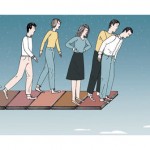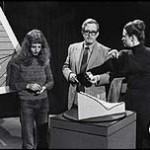Posted on December 20th, 2010 at 5:34 pm by Daniel Weinbren
 The OU has longed claimed that it supports its learners. In an article subtitled ‘Why doing a PhD is often a waste of time’ the Economist argued that nowadays doctoral students and postdoc contract staff in general and across many countries, are treated as cheap, highly motivated and disposable labour and that this is in part due to the mismatch bwetween the aims of the institutions and those of the students. There is no evidence presented as to whether this can reasonably be applied to the OU. If you have postgrad or postdoc experiences of the OU which might be in a debate about how far the OU serves the wider society and the extent to which it is customer-focused, do let us know.
The OU has longed claimed that it supports its learners. In an article subtitled ‘Why doing a PhD is often a waste of time’ the Economist argued that nowadays doctoral students and postdoc contract staff in general and across many countries, are treated as cheap, highly motivated and disposable labour and that this is in part due to the mismatch bwetween the aims of the institutions and those of the students. There is no evidence presented as to whether this can reasonably be applied to the OU. If you have postgrad or postdoc experiences of the OU which might be in a debate about how far the OU serves the wider society and the extent to which it is customer-focused, do let us know.
Posted in Students | No Comments »
Posted on December 16th, 2010 at 5:30 am by Daniel Weinbren
 Today is the anniversary of the broadcast of the OU’s final course-related television programme. At 5.30am on 16 December 2006 Art: a question of style: neo-classicism and romanticism was screened. Its conclusion brought to an end 36 years of broadcasting history. In this blog we’ve used photographs and other still images. In 2011, to mark the 40th anniversary of the 1st OU television programmes in January 1971, we aim to link to a clip of the first Open Forum. It was an attempt to support not merely teaching through transmission but learning through colloboration. Indeed the first Vice Chancellor, Walter Perry felt that ‘like Sesame, Open Forum plays an important role in our informal communications system’ (Walter Perry, Report of the Vice-Chancellor to the council, 1972, The Open University, Milton Keynes, 1973, p. 85).
Today is the anniversary of the broadcast of the OU’s final course-related television programme. At 5.30am on 16 December 2006 Art: a question of style: neo-classicism and romanticism was screened. Its conclusion brought to an end 36 years of broadcasting history. In this blog we’ve used photographs and other still images. In 2011, to mark the 40th anniversary of the 1st OU television programmes in January 1971, we aim to link to a clip of the first Open Forum. It was an attempt to support not merely teaching through transmission but learning through colloboration. Indeed the first Vice Chancellor, Walter Perry felt that ‘like Sesame, Open Forum plays an important role in our informal communications system’ (Walter Perry, Report of the Vice-Chancellor to the council, 1972, The Open University, Milton Keynes, 1973, p. 85).
Read the rest of this entry »
Posted in Occasions, People | No Comments »
Posted on December 15th, 2010 at 3:06 pm by Daniel Weinbren
While the OU has been associated with the construction and reconstruction of national identities, the idea of educational broadcasting helping to cement a notion of national identity did not originate with the OU. This note about Canadian broadcasts considers some of the precedents. There are some clips here. Read the rest of this entry »
Posted in Methods | No Comments »
Posted on December 14th, 2010 at 12:32 pm by Daniel Weinbren
The disruption resulting from academics and students expressing their concerns with the changes to higher education that the coalition government proposes may trigger important changes. Can disruption be useful as a way of understanding the OU?
Read the rest of this entry »
Posted in Ideas, Methods | No Comments »
Posted on December 13th, 2010 at 9:32 pm by Daniel Weinbren
Within a few days of the first TV broadcasts by the OU one newspaper picked up on the comic potential of women studying by watching television. ”The whole idea of the Open University must be a cartoonist’s as well as a student’s dream. Just imagine the problem there may be in some homes when Dad wants to watch one channel, the kids a second and Mum is adamant that she must study for her degree’ (Aberdeen Evening Express 15 Jan 1971). Read the rest of this entry »
Posted in Methods, People | 4 Comments »
Posted on December 12th, 2010 at 11:38 am by Daniel Weinbren
The difficulties of using television to support adult learning was a subject often considered at the OU. In 1976 Arthur Marwick (Professor of History at the OU) explained that his aim was ‘to leave each piece of film to speak for itself without being overlaid by an intrusive commentary’ (Arthur Marwick, ‘History at the Open University’, Oxford Review of Education, 2, 2, 1976, pp. 129-137). In spite of this Marwick’s own soft Scots burr intruded in that it was a
a friendly and melifluous commentary voice. OU students often remarked to me how accessible they found the television programmes and the audio cassettes he narrated, even if they did not always agree with his interpretations (James Chapman, Arthur Marwick(1936–2006): an appreciation, Historical Journal of Film, Radio and Television, Vol. 27, No. 2, June 2007, pp. 237–244 (p240)).
In 1995, Paddy Maguire saw things differently. Wr

iting in the
Journal of Design History, 8, 2, p. 155, made public his irritation about ‘self-conscious didacticism, tinged with aspiring populism customarily adopted by Open University or schools programmes’ producers, wherein an adoption of the familiar second person is presumed to serve as an aid to historical imagination’.
Posted in Methods, People | No Comments »
Posted on December 7th, 2010 at 2:25 pm by Daniel Weinbren
 On his blog Labour Party activist Paul Richards argues that modern Britain has been shaped by the movements and institutions that Michael Young (1915-2002) inspired. Young, he suggests
On his blog Labour Party activist Paul Richards argues that modern Britain has been shaped by the movements and institutions that Michael Young (1915-2002) inspired. Young, he suggests
added to the sum of civil society by launching new entrants to it. By empowering individuals through new forms of organization, he hoped to build new forms of egalitarian community… Young’s ideas were often the spark, but his gift was to be able to cut loose his creations as fast as possible, and allow new people to take over. He launched ships; he didn’t captain them.
While a recognition of Young’s enthusiasm to broaden educational opportunities is welcome, there may be some who will take issue with Paul Richards proposal that The Open University is one of a number of institutions which ‘owe everything to Young’s vision’. Read the rest of this entry »
Posted in People | No Comments »
Posted on December 7th, 2010 at 8:36 am by Daniel Weinbren
William Burnett Benton (1900-1973) was a US Assistant Secretary of State from 1945 to 1947 and a United States senator from 1949 to 1953. He also promoted teaching through radio. For example he was very supportive of the educational radio programme ‘The University of Chicago Round Table’ (see See Cynthia B. Meyers, ‘From Radio Adman to Radio Reformer: Senator William Benton’s Career in Broadcasting, 1930–1960’,
Journal of Radio & Audio Media, 16, 1, 2009, pp. 17 – 29). The reason he features here is that he was an enthusiast for the Open University and very close to Harold Wilson.
Read the rest of this entry »
Posted in Ideas, Methods, People | No Comments »
Posted on December 3rd, 2010 at 1:31 pm by Daniel Weinbren
 The OU was not the first to use radio programmes in conjunction with printed material and study groups in order to support higher education among adults. There was considerable experience of educational broadcasting within the BBC but also, in Germany a two-semester introductory course on education was run in the late 1960s. It is described in Georg Rückreim, ‘The radio course “science of education”‘, Western European Education, Summer/Fall 1970, 2, 2, pp. 176-191. The course was credited by educational departments of universities and the study groups met in local adult educaiton institutes. There were assignments and computer-graded examinations and it was intended that rather than monologues or one-way transmission the learners would engage in dialogue. Nevertheless, much of the broadcast material was lectures and these were revised and then published in 1970.
The OU was not the first to use radio programmes in conjunction with printed material and study groups in order to support higher education among adults. There was considerable experience of educational broadcasting within the BBC but also, in Germany a two-semester introductory course on education was run in the late 1960s. It is described in Georg Rückreim, ‘The radio course “science of education”‘, Western European Education, Summer/Fall 1970, 2, 2, pp. 176-191. The course was credited by educational departments of universities and the study groups met in local adult educaiton institutes. There were assignments and computer-graded examinations and it was intended that rather than monologues or one-way transmission the learners would engage in dialogue. Nevertheless, much of the broadcast material was lectures and these were revised and then published in 1970.
Posted in Methods | No Comments »
Posted on December 2nd, 2010 at 2:05 pm by Daniel Weinbren
 In 1982 Borje Holmberg noted that ‘the library in distance education has so far been given scant attention in spite of the evident importance of the subject’ (Recent research in distance educaiton, V1, V2, FernUniversitat Gesamthochshule, Hagen, 1982). Since that time libraries have developed in numerous ways and their importance for those studying through the OU has not diminished. It appears that there has been little by way of academic analysis since Sheila Howard’s ‘Libraries in distance education’, Canadian Journal of University Continuing Education, 11, 1 February 1985, pp. 45-58. Do you know of other texts in this field? Send us your suggestions.
In 1982 Borje Holmberg noted that ‘the library in distance education has so far been given scant attention in spite of the evident importance of the subject’ (Recent research in distance educaiton, V1, V2, FernUniversitat Gesamthochshule, Hagen, 1982). Since that time libraries have developed in numerous ways and their importance for those studying through the OU has not diminished. It appears that there has been little by way of academic analysis since Sheila Howard’s ‘Libraries in distance education’, Canadian Journal of University Continuing Education, 11, 1 February 1985, pp. 45-58. Do you know of other texts in this field? Send us your suggestions.
Posted in Methods, Online teachng and learning | No Comments »
 The OU has longed claimed that it supports its learners. In an article subtitled ‘Why doing a PhD is often a waste of time’ the Economist argued that nowadays doctoral students and postdoc contract staff in general and across many countries, are treated as cheap, highly motivated and disposable labour and that this is in part due to the mismatch bwetween the aims of the institutions and those of the students. There is no evidence presented as to whether this can reasonably be applied to the OU. If you have postgrad or postdoc experiences of the OU which might be in a debate about how far the OU serves the wider society and the extent to which it is customer-focused, do let us know.
The OU has longed claimed that it supports its learners. In an article subtitled ‘Why doing a PhD is often a waste of time’ the Economist argued that nowadays doctoral students and postdoc contract staff in general and across many countries, are treated as cheap, highly motivated and disposable labour and that this is in part due to the mismatch bwetween the aims of the institutions and those of the students. There is no evidence presented as to whether this can reasonably be applied to the OU. If you have postgrad or postdoc experiences of the OU which might be in a debate about how far the OU serves the wider society and the extent to which it is customer-focused, do let us know.




